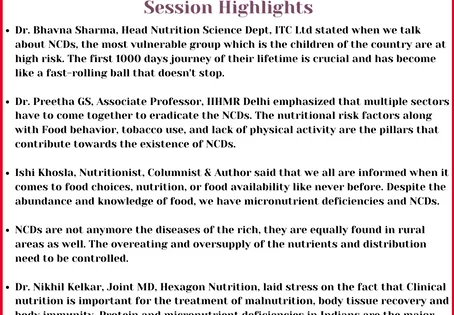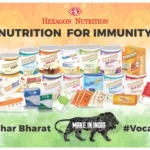Key Highlights
- NCDs are becoming one of the biggest challenges of our Country. Today’s session was moderated by Ms. Prakriti Poddar – MD, Podaar Wellness.
- Today’s session began with a warm welcome by Ms. Prakriti Poddar to an amazing set of panelists, namely:
- o Dr. Bhavna Sharma, Head Nutrition Science Dept, ITC Ltd
- o Dr. Preetha GS, Associate Professor, IIHMR Delhi
- o Dr. Shuchin Bajaj, Founder Director, Ujala Cygnus Hospital
- o Ishi Khosla, Nutritionist, Columnist & Author &
- o Dr Nikhil Kelkar, Joint MD, Hexagon Nutrition
- Dr. Bhavna Sharma, Head Nutrition Science Dept, ITC Ltd mentioned that when we talk about NCDs, the most vulnerable group which is the children of the country are at high risk. The first 1000 days journey of their lifetime is crucial and has become like a fast-rolling ball that doesn’t stop.
- Dr. Bhavna also illuminated the fact that India’s stunting problem in kids represents the largest loss of human potential in any country in human history. A few years ago we had the stats which said that India has 20 times more percentage of children under 5 who are underweight in India, yet despite all nutrition campaigns, policies, programs, and initiatives we are still lagging. In the same breath, Children under 5yrs of age are probably, wasted in India.
- We cannot shy away from the recent heartbreaking demographics released by NNMB & UNICEF, which highlights the fact that adolescents and kids these days have high levels of Cholesterol, Diabetes, Overweight issues and these are the numbers we need to together work at. The application of data and honest research converted into effective policy implementation on how food is handled, manufactured, process, and regulated can handle the alarming situation of rising NCDs very well together.
- Dr. Preetha GS, Associate Professor, IIHMR Delhi emphasized that multiple sectors have to come together to eradicate the NCDs. The nutritional risk factors along with Food behavior, tobacco use, and lack of physical activity are the pillars that contribute towards the existence of NCDs.
- The gamut of care is so comprehensive that we have to take care of the preventive, rehabilitative, curative, and promotive healthcare needs. This is to enable evidence generation and convert it into practice.
- It is important to have a holistic approach & have comprehensive research and teaching plans which can be inculcated to the academic curriculum as well.
- Adding to the conversation, Ishi Khosla, Nutritionist, Columnist & Author said that we all are informed when it comes to food choices, nutrition, or food availability like never before. Despite the abundance and knowledge of food, we have micronutrient deficiencies and NCDs.
- We all have checks and balances but we ignore it all the time. She also advocated the maxim “ Jaisa ann vaisa Mann”, recently mentioned by Hon’ble PM Shri Narendra Modi Ji in Mann ki Baat, and emphasized the fact that we talk about mental health and NCDs it’s all in the gut.
- She ended by saying, that two major problems that need to be addressed are inflammation & addiction to modulate the eating and food behavior issues.
- Dr. Shuchin Bajaj, Founder Director, Ujala Cygnus Hospital, reminded us of the fact that amid the pandemic we have forgotten how scary and dangerous the NCDs are and are contributing to the healthcare burden.
- NCDs are not anymore the diseases of the rich, they are equally found in rural areas as well. The overeating and oversupply of the nutrients and distribution need to be controlled. Childhood obesity is a growing concern and education and awareness sessions are the need of the hour for all the parents and children to handle this issue. Detailed screening and assessment of food should be a mandatory practice before even starting the treatment.
- Dr. Nikhil Kelkar, Joint MD, Hexagon Nutrition, laid stress on the fact that Clinical nutrition is important for the treatment of malnutrition, body tissue recovery, and energy and body immunity. Protein and micronutrient deficiencies in Indians are the major contributors to NAFLD, Metabolic Syndrome, and NCDs.
- The protein requirements increase in people who are hospitalized or are having a medical or disease-specific condition. These conditions by and large can be dealt with specific nutrition formulas relatively and easily available which can be reconstituted in water and can be given orally or can be even administered via Tube feeding Route. These are tailor-made formulations.
- Amid the pandemic, there is a dire need for balanced nutrition and protein considering the unhealthy snacking that we tend to do these days. Education & Awareness needs to be created in the general population that these kinds of personalized formulations are available for ready consumption.
- The session ended by closing remarks by Dr. Bhavna that the population needs to understand, read & adopt the habit of reading food labels. To which Ishi Khosla responded that we cannot expect Public health problems to get sorted out just by mindful eating of food labels. Therefore, the important thing is to talk to people in the easy and practical language they eat food and not nutrients.









